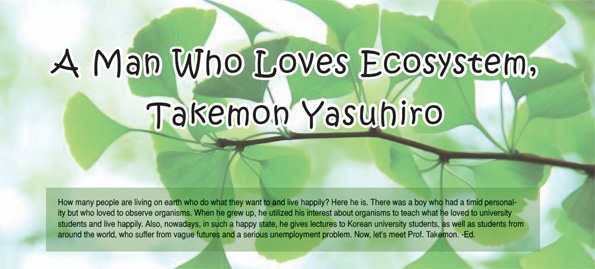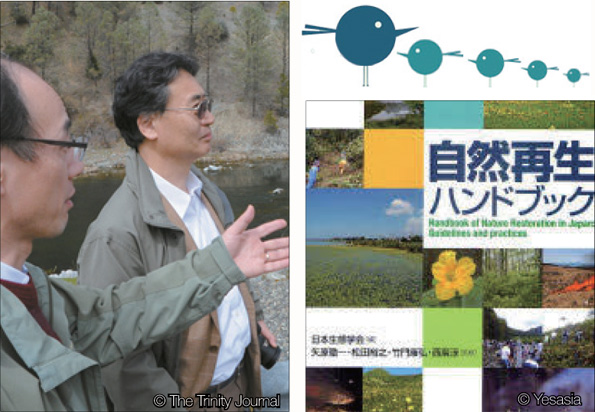
How many people are living on earth who do what they want to and live happily? Here he is. There was a boy who had a timid personality but who loved to observe organisms. When he grew up, he utilized his interest about organisms to teach what he loved to university students and live happily. Also, nowadays, in such a happy state, he gives lectures to Korean university students, as well as students from around the world, who suffer from vague futures and a serious unemployment problem. Now, let’s meet Prof. Takemon. -Ed.
A boy, Takemon, who was a friend to creatures
Prof. Takemon couldn’t hang out with his friends because of his timid character in his childhood. When his friends played catch in the park, he was alone because he didn’t have courage to ask them to play together. He observed the ants and enjoyed watching the plants.
“When I was a young man, I really liked all kinds of creatures. Therefore, I was not lonely even though I didn’t play with my friends. I had a shocking experience at that time. There was a small fishbowl, and some fishes lived there. I loved fishes as much as ants. One day, I saw a pretty flower on the road. It was really beautiful, so I picked it and put it in the fishbowl to make them happy. I was proud of myself to make them happy. At that time, I really thought it was a good action. However, the next day, my father was so angry because the fishes were all dead. That flower contained severe poison. I was embarrassed that I killed my lovely fishes. I still feel sorry for them.”
Guidepost of life : Makino Tomitaro
“I have liked creatures since I was young, but that experience that I already mentioned was my motivation to study biology. At that time, it was a shocking experience for me, so I didn’t want to go through that experience again. I read lots of books. Then, I found the book that made me dream to be a botanist. The book was written by Makino Tomitaro, who was a famous botanist in the world. My interest moved from botany to biology, developing from a high school student to university student, and now I’m a biologist.”
Makino Tomitaro was a famous Japanese botanist in the 19th century. He was the first Japanese person who worked extensively on classifying Japanese plants using the system developed by Linnaeus. There are thousands of kinds of plants which were named by him. He wrote “Makino Botany Collection” in 1936 based on his 50 years research. That book was what Prof. Takemon read. I didn’t understand his choice of becoming a professor. If he liked to read lots of books that were related to botany and liked to observe creatures, why didn’t he become a researcher? So I asked the professor why he became an educator instead of a researcher. His answer had a fresh impact on me.
“In Japan, there is little difference between researcher and professor. Surely, there are specific differences if we separated them in detail. However, it is a general phenomenon that people who want to become great researchers hope to become professors. In addition, most Japanese universities have good laboratories. Then, professors can research conveniently. That’s why I didn’t choose to become a researcher, even though I had a chance to do it.”
How can the professor’s final goal be to be a great researcher? I was really surprised. According to him, Japanese job boundaries are not as clear as Korea’s. People have other jobs or other hobbies from their main jobs. That’s why many Japanese who are not researchers find new knowledge.
Becoming a professor
“The best part of being a professor is freedom. Company researchers can’t manage their time flexibly. They should follow the company’s rules, so they should work at standard times like 9 a.m. to 18 a.m. However, a professor can use time flexibly. I can choose the researching time whenever I want. I can teach students whenever I choose. There is no location restriction. I can teach or research wherever I want. These kinds of freedoms are really important to people like me who like to go out and see various plants. I’m really satisfied being a professor.”
After I saw his face with a big smile while he was talking, I felt the happiness of people who live with what they want to be. In addition, he said that observing plants outside is not work. It is his favorite hobby. Even though he really likes his work, he has faced lots of hardships. I wondered whether he had the experience of wanting to give up or regret his work due to the hardships. I asked him if he had a hard time and what he did when he faced trouble.
“Surely, I faced lots of hardships. However, every time I faced them, I dealt with them positively. I had 3 options to confront the problem. Most of my troubles were opposing government development policies. My first option was becoming a member of a committee. When a government made or realized policies, they made a consultative committee to get advice related to the policies. After I became a member of a consultative committee, I told my opinions to other committee members. Other committees agreed with my opinions. Then, it becomes the committee’s opinion and it has more possibility to be accepted by the government than if I had acted alone. The second option was education. I didn’t have a chance to be a part of a committee every time. Then, I taught my students my thoughts. My students would think the same as me and my thoughts would gradually become standard thoughts to them. We couldn’t see this effect in the short term but it was powerful in the long term. The last option was acting by myself. I’m a professor but also a member of a group. I entered a group which thought same way as me. Gathering the power of other people, I could transfer my thoughts more efficiently.”
When people have their hardships, there are not many people who take the bull by the horns. However, he is different. The more severe the trouble is, the more he tries to confront the problem. Now, I can understand why he has many careers.
The professor gave advice to students, not only for Korean students but for students all over the world, who have a hard time finding jobs or unclear futures.
“I know their hardships. Unclear futures and hardships of getting a job produce a nervous atmosphere. To overcome this situation, many students are spending much of their energy on building experience like certifications, contests, group work, etc. It is so stressful to them. Many people give up before achieving their dream or job. However, I think the most important thing for them is taking away their quick temper. Hold your horses and keep doing what you want. Chances will come if you wait patiently. Don’t give up. Just do it.”

By Lee Da-yeon
dy34@cbnu.ac.kr


 All
All People
People






 Lee Da-yeon
Lee Da-yeon













